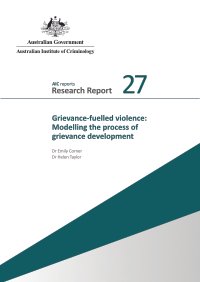By Emily Corner and Helen Taylor
Acts of extreme or mass violence perpetrated by lone offenders have become increasingly common in liberal democracies over the past 20 years. Some describe these acts as politically motivated, while others attribute them to mental disorder or criminal intent. This has led to the development of distinct research and practice areas focusing on either violent extremism, mass murder, fixation, stalking, or familial and intimate partner homicide. However, there is increasing understanding that the distinction between political ideology, criminal intent and personal motivation is blurred, and that the violence carried out by these individuals is better understood using the broader concept of grievance-fuelled violence. This work is the first to empirically consolidate the existing research in these distinct areas, employing a multifaceted analytical approach to develop a holistic model of the processes of grievance development among those who commit grievance-fuelled violence.
Research Report no. 27. Canberra: Australian Institute of Criminology. 2023. 95p.



